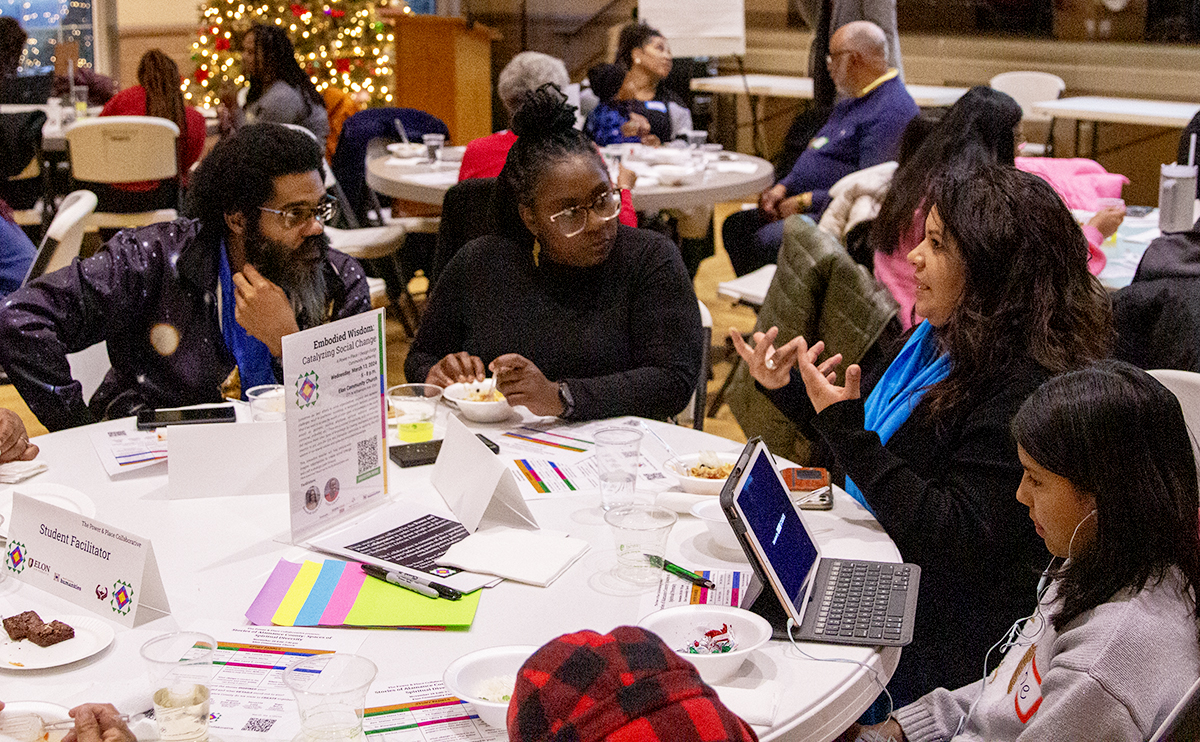Stories of Alamance County: Spaces of Faith and Spiritual Diversity was the culmination of a semester of community dialogue and students’ oral history projects.
Celebrating the varied faiths of Alamance County residents — and the potential for change in listening across those differences — The Power and Place Collaborative hosted Stories of Alamance County: Spaces of Faith and Spiritual Diversity at Elon Community Church on Wednesday, Nov. 29.
The event featured nine short films of residents telling their life stories and reflecting on ways religion helped them find community after being born in or moving to Alamance County. Those featured included faith leaders of prominent Black, Protestant and Catholic churches, and the Burlington Masjid. The films were created in partnership with community storytellers and students from Honors Fellows’ second-year seminar and Human Service Studies senior seminar during the fall semester.
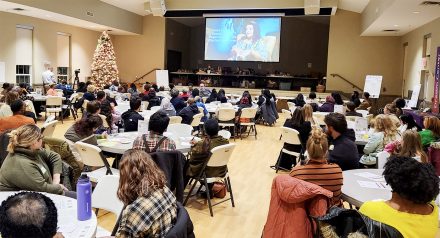
More than 120 people gathered in the church’s fellowship hall to share a meal and conversation sparked by the films, which are available to the public on the Power and Place Collaborative website.
“To learn these stories has been so impactful,” said Lorena Meza Lara, a member of Blessed Sacrament and CityGate Dream Center who was the subject of one of the films, at the end of the program. “It’s powerful to know that there are so many things we have in common. If we share these messages with our children, our world will be stronger.”
The multifaith project will continue this spring and include a March 13 event, Embodied Wisdom: Catalyzing Social Change, from 5 to 8 p.m. at Elon Community Church.
The Power and Place Collaborative is an effort by various programs at Elon, Burlington’s Mayco Bigelow Community Center and the county’s African American Cultural Arts and History Center to collect and share stories intended to bridge divides and open dialogue in the community, particularly from Alamance County’s Black and minoritized communities. Since 2018, students in Honors Fellows seminars and Human Service Studies courses have met with, interviewed and recorded nearly 50 residents’ stories.
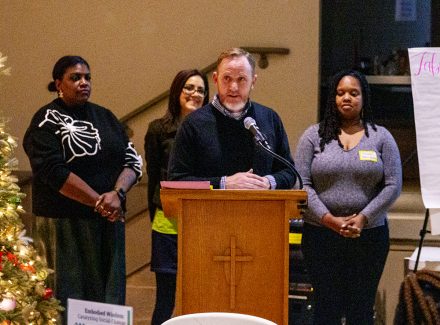
This year, the collaborative received a $20,000 grant from North Carolina Humanities, a state affiliate of the National Endowment for the Humanities and a $10,000 Impact Alamance Community Forward Grant to collect and share stories intended to bridge divides and open dialogue in the community.
On Wednesday, participants met in small groups around tables to discuss each of the nine stories shared and respond to prompts exploring how communities are strengthened in and by places of worship. Those responses will be compiled in a report and given to elected and community leaders, said Danielle Lake, director of the Center for Design Thinking.
“This spring we are hoping to partner with Alamance County Public libraries to create Power and Place StoryWalks across the county. These storywalks would feature diverse stories from residents and encourage community members to contribute their vision for Alamance County,” Lake said.
Previous projects have focused on how diverse community members have cultivated community, broken barriers, and catalyzed community change. A study and report by the Harwood Institute with Impact Alamance showed the need for more conversation around spirituality, as well as the potential for Alamance County’s faith leaders and congregations to create change.
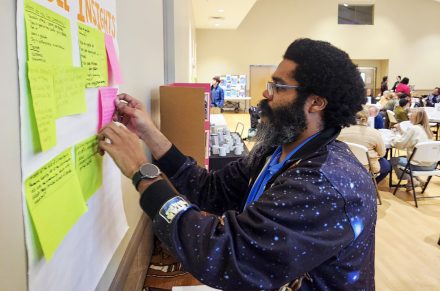
Several other events this semester fostered discussion among the community, including a September gathering with Monica Guzmán, author of Elon’s Common Reading, “I Never Thought of it That Way: How to Have Fearlessly Curious Conversations in Dangerously Divided Times,” and a book club around the book.
“This is the first semester we’ve really made the entire community our classroom,” said Associate Professor of Geography Sandy Marshall. “Every week, our students have gone to a different community space, place of worship or part of Alamance County to learn more about how diverse our county is.”
Marshall co-teaches the Honors seminar Place and Placemaking with Lake. Those students pair with students in the Human Service Studies Program’s senior seminar taught by Associate Professor Vanessa Drew-Branch to collect oral histories.
Students said the experience of connecting with the interview subjects and the community at large was surprising, illuminating and grounding.
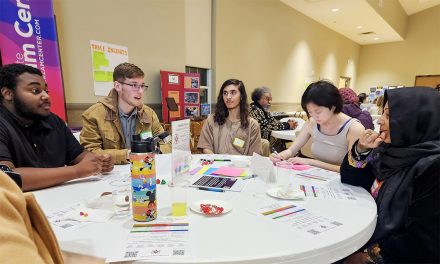
“It’s another way to show that individuals have an impact on the community,” said Ethan Lane-Blake ’24, a human service studies major from Athens, Georgia. “People think their stories are small. This gives voice to them and lets them know how big a difference they make on their communities and the people that they’ve touched.”
Merrie Byers ’26, of Wake Forest, North Carolina, said learning about the richness of lives in Alamance County made her want to be more active in her home community.
“To know all these different stories is an experience I wouldn’t trade for anything else,” Byers said. “It’s overwhelmingly good.”
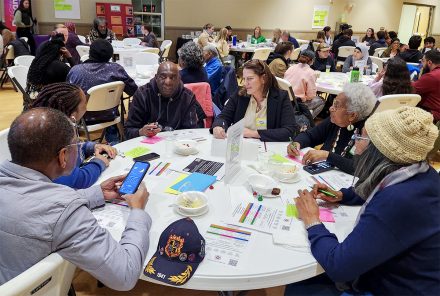
Elon President Connie Ledoux Book addressed the crowd after discussing the stories and themes at one of the tables.
“I’m grateful for people’s courage to put into words their lived experience and tell a personal story because it’s powerful,” Book said. “When you say it from the heart and you hear it firsthand, it never goes away. I’m confident that that love, faith and personal narrative is how we change our communities.”



